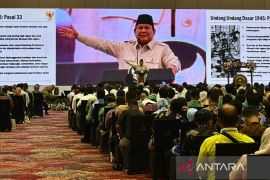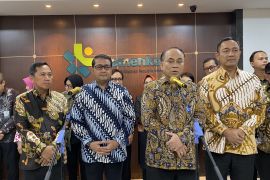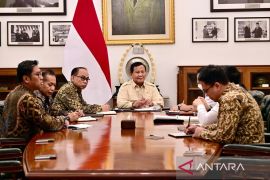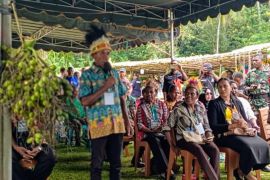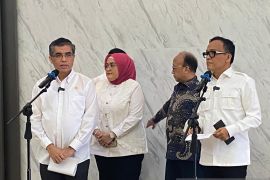"Economic gaps could be narrowed with the emergence of more entrepreneurs and young businessmen," Speaker of the People`s Consultative Assembly (MPR) Zulkifli Hasan said.Jakarta (ANTARA News) - Income disparity among the Indonesian people is very high and needs to be overcome with expansion of entrepreneurship so that the state would not face difficulties in feeding its 258 million people.
Entrepreneurs promote economic growth. But today, business owners account for less than 2 percent of the Indonesian population. Neighboring countries, such as Singapore and Malaysia, have much higher rates, according to Tasa Nugraza Barley in an article in the Jakarta Post in Dec 2014.
In advanced countries, entrepreneurs grow rapidly and help increase the economic growth. Indonesia should therefore develop its entrepreneurship like that of developed nations, particularly among those that are marginalized.
Prosperity development in advanced states is promoted by expansion of entrepreneurship, while in developing countries, such as in Indonesia, it still depends on the state. "Unluckily, in reality, the development of our entrepreneurship is still lagging far behind," legislator Jazuli Juwaini of Commission I of the House of Representatives (DPR) said in Jakarta on Monday (April 17).
The legislator argued that Indonesias entrepreneurs account for only about 1.5 percent of the countrys population, a figure which is still far from the ideal one. If compared with those of other ASEAN countries, the percentage of Indonesias entrepreneurs is still very small.
Entrepreneurs in Singapore, for instance, account for 7 percent of the population. In other ASEAN countries like Malaysia, Thailand, and Vietnam, entrepreneurs account for 5 percent, 4 percent, and 3 percent of their population, respectively. But in Indonesia, disparity is still high because the number of its entrepreneurs account for only 1.5 percent.
Hence, the Faction of the Prosperous Justice Party (PKS) in the DPR is initiating a draft law on national entrepreneurship in an effort to boost and accelerate the development of entrepreneurship in Indonesia, particularly among those that are still marginalized.
Earlier, Speaker of the Peoples Consultative Assembly (MPR) Zulkifli Hasan noted that developing entrepreneurship, notably for younger generation, is a solution to overcome economic disparity in Indonesia.
"Economic gaps could be narrowed with the emergence of more entrepreneurs and young businessmen," Hasan remarked.
The MPR speaker also touched on the role of financial institutions in reducing disparity by providing easy financial/capital access and paying attention to local entrepreneurs.
He also suggested the adoption of land redistribution for the people through the revision of the agrarian law. Land ownership is essential for the people to develop their potential and productivity, as well as their entrepreneurship.
The organization which has most competence in developing the countrys entrepreneurs is HIPMI (Indonesian Young Entrepreneurs Association). Therefore, President Joko Widodo (Jokowi) has called on the association to play an active role in promoting economic equality, notably through the redistribution of assets.
Jokowi made the request at the opening of the 16th National Working Meeting of HIPMI and the launch of HIPMIs Go to School 2017 program in Jakarta late last month.
"I have spoken about this to the HIPMI general chairman. I urged HIPMI after this working meeting that it should play an important role in promoting the economic equality policy, particularly through the redistribution of assets," he noted.
The government has prepared land to be distributed to the people through the agrarian reform and asset redistribution program. The program is launched as part of the efforts to promote equality through cooperatives, Islamic boarding schools, and other channels, such as the customary communities.
The president noted that in 2045, Indonesias population is expected to reach 309 million, with an economic growth of about five to six percent and a gross domestic product amounting to US$9.1 trillion.
"This is a giant leap, but who is going to play the role? Of course, the HIPMI, because (those) like me would have become senior citizens or would have already passed away. Hence, those from the HIPMI will play the required role," he emphasized.
He called on young entrepreneurs to continue to reinforce themselves in an effort to face the competition and remain competitive.
"My era is that of competition, but what I am doing is offering opportunities to the younger generation," he added.
HIPMI Chairman Bahlil Lahadalia said the number of small and medium-scale businesses in Indonesia had reached 56 million, but in terms of assets and business capacity, they had not shown significant growth, while conglomerate businesses have continued to grow faster and seen a spectacular increase in assets.
"This has created a wider gap in businesses. There is something wrong with our policy and industrial structure. Some have enjoyed incentives, some have disincentives," Lahadalia said.
He added that large-scale businesses have created an unhealthy business ecosystem and reduced competition. On the other hand, a conglomerate run system would increase the chances of a monopoly being created as large-scale businesses would dominate a business from upstream to the downstream sector.(*)
Reporter: Andi Abdussalam
Editor: Heru Purwanto
Copyright © ANTARA 2017

